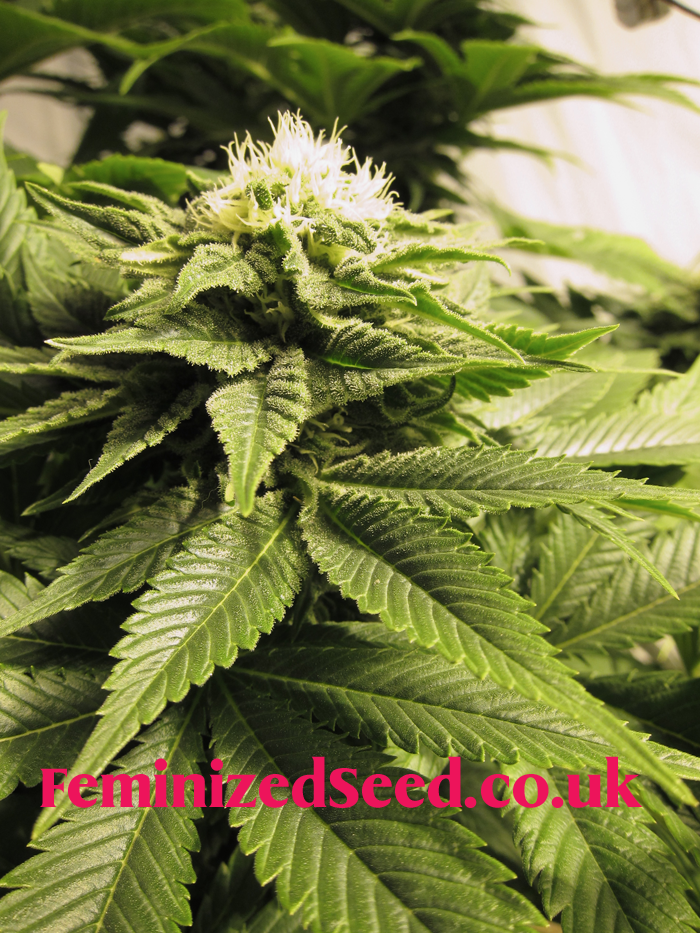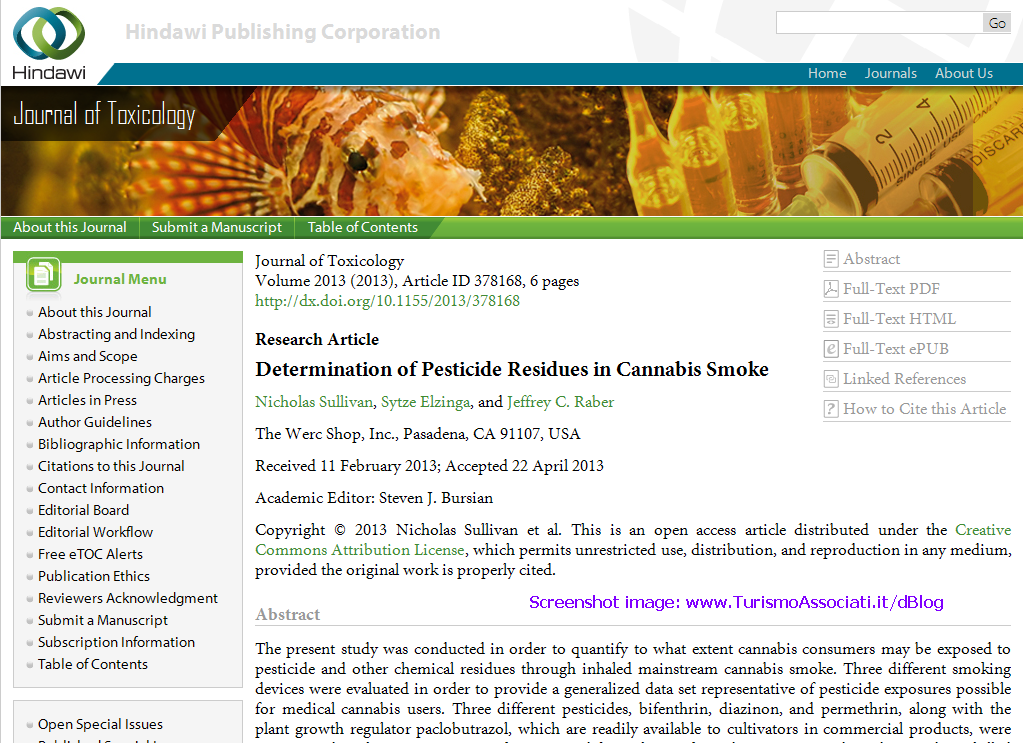|
Di seguito gli interventi pubblicati in questa sezione, in ordine cronologico.
The cannabinoid that could erase decades of work is beta-caryophyllene (BCP). BCP is found in the essential oils of a variety of plants, including rosemary, hops, cloves and, of course, cannabis. It's also highly present in black pepper.
While BCP was first synthesized in 1964, it wasn't until 2008 that a group of German and Swiss scientists, led by Andreas Zimmer, Ph.D and Ildiko Racz, Ph.D of the University of Bonn, discovered that BCP is a cannabinoid.
And not just any cannabinoid, but one that acts specifically on the body's CB2 cannabinoid pathways. On the other hand, the pathways responsible for the marijuana high, CB1 receptors, aren't affected by BCP. Writing in the journal Proceedings of the National Academy of Sciences (PNAS), they summarized:
"Here, we report that the widespread plant volatile â-caryophyllene (BCP) selectively binds to the CB2 receptor and that it is a functional CB2 agonist. Intriguingly, BCP is a common constituent of the essential oils of numerous spice and food plants and a major component in Cannabis."
Interestingly, scientists have been trying to develop a viable synthetic cannabinoid that targets only CB2 receptors for a very long time.
Many now exist, and research has shown the promise of CB2-selective cannabinoids in combating many inflammatory disorders, ranging from arthritis and bladder cystitis to multiple sclerosis and HIV-associated dementia. And all without the marijuana high.

But Dr. Racz and Dr. Zimmer's latest study, published last month in the journal European Neuropsychopharmacology, shows that BCP produces similar anti-inflammatory effects. Although the study was only done in mice, they found that BCP given orally was more effective than injections of the synthetic CB2 cannabinoid JWH-133.
This, they note, suggests that BCP could indeed be a superior medicine than synthetics. Not to mention, it's widely available as a food.
"It is likely that BCP belongs to a group of common plant natural products with major potential impact on human health. The oral intake of this dietary cannabinoid with vegetable food could be advantageous in the daily routine clinical practice over synthetic cannabinoid agonists."
Unfortunately, although still in its early stages, the discovery of BCP and its potential to eliminate synthetics sets a dangerous precedent. Frankly speaking, modern medicine isn't too friendly with the idea of plants replacing pills. And medical marijuana makes for a great example.
Source: LeafScience.com
Sativex is an oral spray made from ingredients derived from the whole cannabis plant. The two main compounds in cannabis – CBD and THC – are present in Sativex in an equal 1:1 ratio.

Both cannabis compounds (known as cannabinoids) have shown anti-cancer properties in pre-clinical studies, and seem to be effective against a wide range of cancers. Anecdotal reports also suggest that cannabis and cannabinoids have the ability to fight cancer.
However, GW Pharmaceuticals is the first company to initiate clinical research on cannabis-based medicine as a cancer therapy.

While GW has previously funded a number of pre-clinical studies on the anti-cancer effects of cannabinoids, this will be the first time the company investigates the effects in human patients, said GW Director of Research and Development Dr. Stephen Wright in a press release.
"We are very excited about moving this compound into further human study and the prospects of cannabinoids as new anti-cancer treatments. This is GW's first clinical study of cannabinoids as a potential treatment to inhibit tumor growth."
The company plans to investigate Sativex as an add-on to the standard chemotherapy agent temozolomide, rather than a stand-alone. According to GW Pharmaceuticals, pre-clinical research suggests that cannabinoids can improve the anti-cancer ability of temozolomide.
The Phase 1b/2a trial announced on Monday will involve 20 patients with recurrent glioblastoma multiforme (GBM), an aggressive and rare form of brain cancer that accounts for about 50% of all brain cancers diagnosed in the U.S. each year.
The trial will first have to prove the safety of the combined treatment regimen before further research can be done on its effectiveness.
In the U.S., clinical trials of cannabinoids for cancer are also expected in the near future. Sean McAllister, Ph.D and his colleagues at California Pacific Medical Center hope to begin the first human studies of CBD for breast cancer within the next 12 months.
Sativex is currently approved in more than 20 countries for the treatment of multiple sclerosis symptoms, and is also being studied as a treatment for cancer pain.
While Sativex has been GW's leading product, the company has a number of other cannabinoid-based drugs in its pipeline, including an epilepsy drug called Epidiolex.
Epidiolex, which contains more than 98 percent CBD, recently began clinical trials in the U.S. and UK as a treatment for pediatric epilepsy.
Source: LeafScience.com
While cannabidiol (CBD) has shown anti-cancer effects in previous studies, recent research from Temple University's School of Pharmacy in Philadelphia and the California Pacific Medical Center points to a more comprehensive role of CBD in cancer therapy.
The study was co-authored by Dr. Sean McAllister, who was also one of the first scientists to demonstrate the ability of CBD to kill breast cancer cells and slow tumor growth. He explains that the latest findings show that CBD may not only slow cancer, but also prevent the nerve damage (neuropathy) and related pain caused by traditional chemotherapy drugs.

"It suggests that in patients CBD could treat neuropathies induced by first - line agents while also inhibiting cancer progression."
Published in the British Journal of Pharmacology, the researchers carried out a number of experiments involving cell culture and animal models.
Treatment with CBD was able to protect mice against nerve damage caused by the chemotherapy drug paclitaxel, without noticeable side-effects. What's more, combining CBD and paclitaxel seemed to produce a greater anti-cancer effect than either treatment alone.
According to the team, there is currently no treatment considered to be effective at reversing chemotherapy-induced pain. Overwhelming pain, especially during late stages of cancer, can sometimes lead patients to stop chemotherapy altogether.
As for CBD's potential to fight cancer, Dr. McAllister plans to begin the first human trial involving CBD as a treatment for aggressive breast cancer in the next 12 months (article dated 19 Nov, 2013 - N. Red. TurismoAssociati.it) .
The study was published ahead of print and no sources of funding were reported
Source: LeafScience
The study was conducted by Alfred Reid, MA and Elin Kondrad, MD of St. Anthony North Family Medicine Residency and included survey responses from over 500 members of the Colorado Academy of Family Physicians.

Published in the Journal of The American Board of Family Medicine, the results suggest that only a minority of doctors in Colorado support medical marijuana, but a large majority believe more training should be offered.
"Respondents to our survey demonstrate a strong desire for educational opportunities about medical marijuana at all levels of medical education."
Of the 520 family physicians that responded, only 19% agreed that medical marijuana should be recommended.

On the other hand, 80% agreed that medical marijuana education should be taught at medical schools. 82% also agreed that medical marijuana education should be part of family practice residency and 92% thought continuing medical education about medical marijuana should be available.
Interestingly, opinions on marijuana's schedule 1 classification were relatively split, with 37% in support of its classification and 44% in disagreement. As a schedule 1 substance, federal law classifies marijuana as having no recognized medical use and hinders research from being conducted.
But despite the caution expressed by most doctors, medical marijuana is widespread in Colorado. An estimated 163,856 patients – or 2% of the entire state population – are legally authorized to use medical marijuana.
Source: LeafScience
While marijuana is believed to have some effect on genes, scientists have only recently begun to investigate how it might apply to medicine.
In the latest study, published in the Journal of Biological Chemistry, researchers at the USC School of Medicine identified a specific set of microRNA (miRNA) molecules that were altered in rats dosed with THC.

miRNA play a role in regulating genes and are believed to contribute to a number of diseases. Out of 609 different miRNAs that the study looked at, 13 appeared to be significantly affected by THC, including one (mir-690) that is strongly linked to inflammatory responses.
The study was led by Prakash Nagarkatti, Ph.D and Mitzi Nagarkatti, Ph.D, who have spent more than a decade investigating the role of THC in autoimmune diseases, reports The State.
The researchers believe THC's effect on mir-690 expression is especially promising, concluding that further research could lead to new therapies for "inflammatory diseases as well as cancer."
Dr. Mitzi Nagarkatti elaborated on the findings in an interview with Counsel & Heal:
"While our study identifies the molecular mechanism of immune-altering effects of marijuana, select microRNA identified here could serve as important molecular targets to manipulate MDSC activity in cancer and inflammatory diseases."
Earlier this year (article from Nov. 2013 - N. Red. TurismoAssociati.it), a group from Italy obtained promising results with three other chemicals in marijuana – cannabidiol (CBD), cannabigerol (CBG) and cannabidivarin (CBV) – in reducing harmful genetic activity related to a variety of skin disorders, including cancer.
The Italian group also concluded that marijuana's gene-modifying potential may "extend well-beyond skin disorders" to diseases like multiple sclerosis and other forms of cancer.
The study received funding from the National Institutes of Health (NIH)
Source: LeafScience
Tourism in Colorado Boosted with Legalization of Marijuana
Since January 1, 2014 marijuana use was legalized in Colorado along with Washington. All the Cannabis supporters were happy with the state’s decision to legalize recreational marijuana. Marijuana business is just booming and companies already fear shortage. After this new legislation in Colorado, the increasing touristic affluence has greatly benefitted the private companies, majorly because of those people who look forward to participating in various activities involving recreational uses of marijuana. “I think it is a great idea, showing people around, showing people the different programs, showing them the different types of weed, showing them the different areas,” said cannabis tourist Debbie Grossett. Companies have included cannabis as a main subject while offering tourist packages, which involve cannabis cooking classes as well. Chefs demonstrate different ways of cooking by using cannabis in various dishes. For vacationers looking for an alternative relaxing vacation with joints rather than a beach vacation, Colorado is surely the place to go.

The Green Tours!
Tourists are also given the opportunity to explore marijuana fields, events, and parties that provide insights into the consumption and use of marijuana. These tours are famous by the term “green tours” and gaining popularity and acceptance from people who are curious to get information on cannabis. The tourist information desk at the Denver International Airport offers a list of around 20 facilities where marijuana selling and buying is legal. There are “bus ferries”, which take tourists for a tour of three marijuana dispensaries for about $399, excluding the cost of marijuana that they may buy over and above that!
Limitation on Possessing Marijuana
There is lot of leeway for the citizens of Colorado towards pot culture. One ounce per visit could be bought by the adults (21 years and older), and they can smoke it in privacy at their homes. However, visitors have restrictive access to marijuana. There are several federal and state laws which limit the tourists to buy a quarter ounce only, while there are consumption restrictions as well.
No Smoking Zones
The “No Smoking” zones include forests, Ski Mountains, historic sites, trails, national parks, and federal land. Hotels, restaurants, entertainment venues, and bars are covered by Clean Indoor Act, and these would also come under no smoking permission, including outdoor public spaces. Marijuana dispensaries have clearly put up instructions about the dos and don’ts related to the use of marijuana on their premises. Leftovers cannot be taken home. Tony Verzura, the co-founder of RiverRock dispensary in Denver stated, “You need to come educated about local laws and be prepared to ensure complete compliance, and avoid unnecessary trouble.” Though the current marijuana tourism revenues are impressive, its fortune may or may not be favorable. Of course, it has America’s first marijuana recreational shops , but Washington will soon follow the same this year.
Source: Cannabis News Network
A foodie “gastro-guide” who was profiled last year for his popular food tours of Seattle that he personalizes, Bryce Lathrop from the White Mustache Urban Adventures is all set to add on to his set of specialized events, “high-end all-inclusive marijuana adventure”.

First Tour Slated on April 2, 2014
The first tour is said to take place on 2th of April. Lathrop is organizing the event to be a multi-day one which will include classes for cooking savory items as well as sweet items using marijuana along with a “behind the scenes access to dispensaries, head shops, and grow facilities,” that carries a promise of eating of loads of goodies and food in a “legal and responsible” way. Just as his other food tours, Lathrop and his other guides will be driving the participants of the tours themselves like always between the stops. Lathrop adds with great gusto -“There is zero reason for these people to have to drive or do anything; I’m tucking them in at the hotel at the end of the evening.” The drive to the hotel will be after a stop for a late night snack in a place like Dick’s Drive-in or even Loretta’s North Western in South Park. The total cost of the multi-day tours which includes about 3 nights in a, what Lathrop calls “5-star Seattle downtown hotel,” is $1420.
Legalization of Weed in Seattle Has Brought a Radical Change

Ever since marijuana was legalized in the Seattle, Lathrop reveals that he has been contacted by several potential pot tour takers; his tour business covers places like Vancouver and Portland. He is known to conduct a number of themed and specialized events like a tour he calls “Musical plates” that is a perfect combination of live music and food. When he was initially suggested to do pot tours, he turned it down. But one fine day, a client pointed out how extremely successful such ventures have been in Denver (where pots are legalized), he decided to give it a shot. Since a lot of food tours happen in the evenings, he decided the pot tour could help get his licensed limousine company engaged during off hours. He said,“Denver is really trying to pitch itself as the New Amsterdam, so I’m sure Seattle’s going to do it too. I just really wanted to be the first.” While he has been advertising this tour to travellers, many citizens of Seattle have requested him on his Facebook page to do scaled-down versions of this tour that is specialized for Seattleites.
Source: Feminizedseeds
There are many reasons why people smoke marijuana. Some do it recreationally, some for medical purposes, and even some who consider it a part of their religion or spirituality.
In ancient times, cannabis was used in India by Hindu saints. Herodotus, an ancient Greek historian, wrote about its use in ceremonial practices by the Scythians, who were an Iranian tribe known for their use of horses.
In more recent times, the Rastafari movement that began in Jamaica promotes the spiritual use of marijuana. They use it as a way to worship their messiah, Haile Selassie, and as an aid to meditation. Rastafaris believe cannabis was the tree of life as described in the book of Genesis. Its use is sacramental and deeply religious, and it is believed smoking brings one closer to God. However, it is not necessary to smoke marijuana to be a Rastafari.

The Rastafari are not the only ones who hold this view of marijuana. In the year 2000 Roger Christie founded what is now known as the THC Ministry. In this religion, cannabis is considered to be a sacrament, not unlike communion. Members practice their religion with an emphasis on cannabis' healing and enlightening properties.
The cornerstone of the THC Ministry's belief is that the cultivation and use of marijuana is a human right provided by God and protected by the constitution. They believe cannabis was the original sacrament of almost every major world religion, and that the plant has the ability to satisfy our every desire.
The church's mission involves promoting use of the hemp plant and opening people's eyes to its benefits, and it is active in the legal and social issues surrounding its use in the Unites States. However, they ran into trouble with the law in 2010, when the founder and a few others associated with the ministry were accused of marijuana possession and trafficking. Since then, Christie has been in and out of court defending his beliefs.
Religions like Rastafari and the THC Ministry fall under an umbrella term called Cantheism. This is a modern term used for religions who base their beliefs on how awesome the cannabis plant is, while neither endorsing or condemning other religions or faiths that do not agree. Adherents to these religions can be known as cantheists, or cannabists. A treatise describing all the beliefs associated with Cantheism can be found here.
My favorite part about Cantheism is how seriously it approaches the matter. For example, the very first creed states: "I believe that Cannabis sativa is the useful cane and the true hemp." Part of the Cantheist code also states that followers "will share (their) faith, but not be obnoxious about it." In this kind of situation, I think it's important that religions centered around marijuana appear serious and professional, lest they be judged as a religion of pot heads.
Other churches, like the Universal Life Church, are welcoming to people who would consider themselves cantheists. Those who feel strongly about such matters and want to take it to the next level can even get ordained for free. The only requirement is that one's beliefs and practices may not discriminate or infringe on the rights of others.
While I personally have a more conservative approach, and would disagree with the notion of uniting cannabis and religion or spirituality, I understand why some choose to follow this path. Those who do should take it seriously, though, because faith and spirituality are serious things. With the way things are changing in the United States regarding marijuana laws, it seems logical to assume Cantheism will become more prevalent.
Source: weedist
1 – Cannabis seeds contain the "genotype" of the plant, the genetic code which provides the instructions for building the finished "phenotype". This DNA is often a hybrid of genetics from the three recognized cannabis sub-species: Sativa, Indica and Ruderalis.
2 – Many of the commercially available cannabis seeds are feminized: this means that they are likely (but not guaranteed!) to produce female plants rather than male ones. This is very handy for breeders who otherwise have to great lengths to make sure that they separate the male from the female plants.

3 – Genetics from the Ruderalis sub-species are often included in popular strains because this is the only one of the three main types which flowers based on age rather than the length of daylight exposure – thus creating autoflowering seeds. This, along with the fact that Ruderalis is a very hardy herb, means that it is prized for creating hybrids even though its natural THC content is extremely low.
4 – Cannabis seeds can be stored for years without significantly reducing their viability. They need to be somewhere dry, dark and cool; ideally they should be stored at around 6C, and in an air-tight or vacuum-packed container.
5 – The majority of cannabis seeds on the market are hybrids from a dizzying lineage of cross-breeds. Seeds of landrace strains are different: they’re from plants which occur naturally in the wild, and their genetics have been shaped by natural – rather than artificial – selection.
6 – Hemp oil, which is produced by pressing cannabis seeds, is used in the manufacture of a wide range of beauty products and plastics, but it is also prized as a food supplement because of its high levels of essential fatty acids (EFAs). The seeds themselves contain no THC, so hemp oil is not psychoactive.
7 – Cannabis is a pretty hardy weed, so it isn’t actually that difficult to get the seeds to turn into seedlings: they will grow whenever and wherever they get the chance. To germinate they need moisture, warmth and a little bit of time. Most seeds will start to produce roots within 72 hours of being tucked up somewhere damp and humid, and although they are very delicate at this stage, they will grow quickly if they get sufficient sunlight and nutrition.
8 – Cannabis seeds have been found on a wide range of archaeological sites, including in Viking ship burials and within the tombs of Chinese mummies. Often they appear in contexts where hemp was not widely used for rope or textiles, suggesting that it was the THC which appealed to the people who left the seeds there.
9 – In southern Poland there is a traditional soup called siemieniotka which is made from cannabis seeds. It is traditionally enjoyed at Wigilia, the Christmas Eve supper that forms the focal point of the Christmas festivities.
10 – The law regarding cannabis seeds changes from country to country – and even within countries. So while it’s perfectly legal to purchase and own cannabis seeds in many countries please check your local laws to make sure that owning a few seeds is not going to land you up in jail!
Seedscanner is currently comparing over 12,000 cannabis seeds (and counting!)
Source: ismokemag
The issue is, despite marijuana being legal in over 20 states, only a handful have implemented measures to ensure product quality.
For instance, in California, laboratory testing is completely optional. And that's bad news, warns Jeffrey Raber, who holds a Ph.D in chemistry and runs a marijuana testing lab called The Werc Shop.

According to Dr. Raber, pesticides are present in about 10% of samples that are sent to The Werc Shop. While mandatory lab testing would be the ideal solution, Dr. Raber recently set out to determine just how much risk pesticides really pose.
His study, published in the Journal of Toxicology, shows that using a filtered smoking device can drastically reduce the conversion of pesticides into inhalable smoke.
Dr. Raber and his team used a McFinn's Triple Filtered Water Pipe for the study, which filters smoke through both cotton and carbon layers.
Unfiltered pipes and bongs, however, appear to offer far less protection against pesticides.
While research has yet to identify the specific health effects of smoking contaminated marijuana, Dr. Raber believes that patients with compromised immune systems are most at risk.
Source: Times-Standard via LeafScience
|